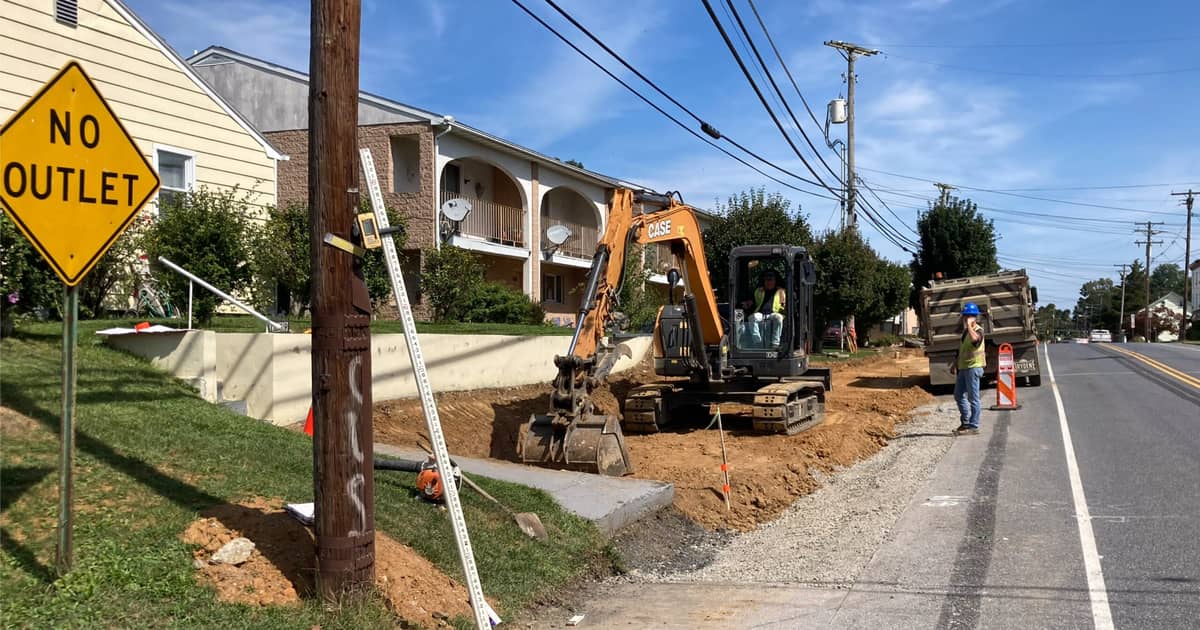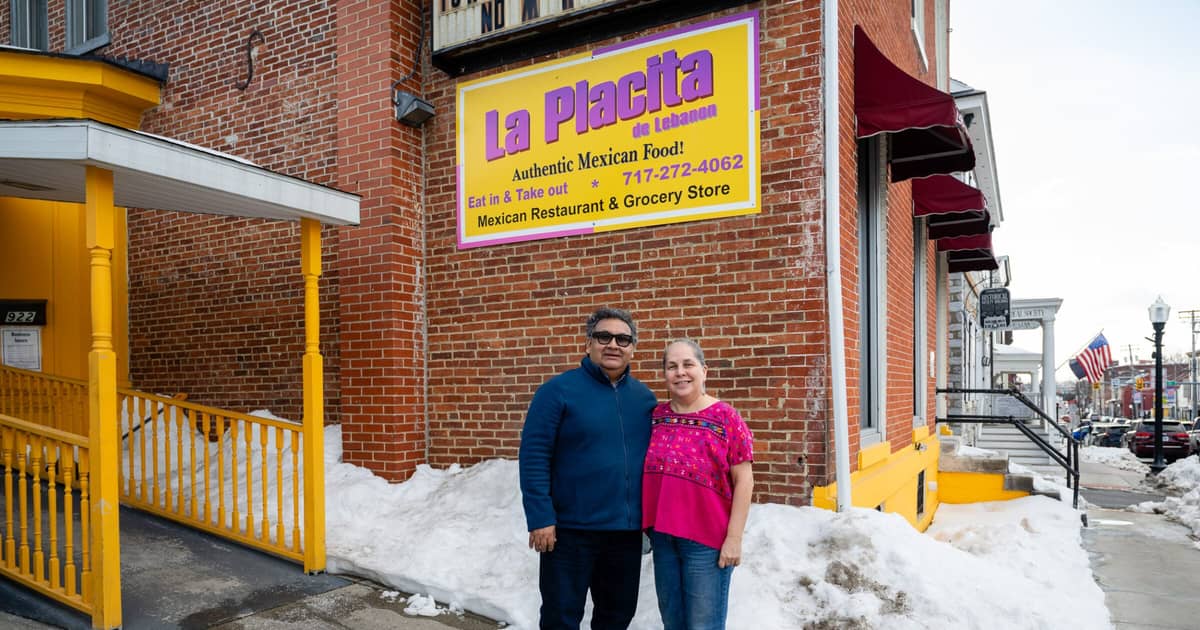It’s difficult for John Wengert to pick his favorite section of the Lebanon Valley Rail Trail.

There are, however, portions that hold a certain fondness in this heart.
There’s Phase 10, which runs from Route 22 to Lickdale Road and is scheduled to begin construction next year.
“Phase 10, when it is finished, because it is really scenic along the Swatara Creek,” said Wengert, president of Lebanon Valley Rails-to-Trails. “I wasn’t aware – I wasn’t familiar with that area – until we went out, started scoping out that project extension and walking it. I was amazed by just how scenic it is. You feel like you are in a different part of the country. You feel like you are out west. Being that close to Lebanon, it’s just an undiscovered gem in our project.”
Then there’s the section Wengert rode when he was young.
“The other part I have a connection to is near this section along Butler Road,” he said. “As a fairly young kid, I rode this section, either on horseback, because we had horses, or later on my mountain bike. But I was pretty connected to this growing up. And it is also nice. It goes through the woods near Mount Gretna.”

LebTown recently visited with Wengert to update readers on the rail trail’s progress. Wengert had just received an updated chart from the engineering firm in charge of the 25.7-mile rails-to-trails project.
When completed in 2027, the trail will run from the Lancaster County line in the southwestern section of the county to Lickdale Road in northern Lebanon County. Although that’s where the LVRT ends, it will connect bike enthusiasts to another trail at Swatara State Park that continues to Pine Grove in Schuylkill County.
Wengert explained that the new chart provides the most current information on “right-of-way acquisitions, funding, construction and dates.”

Phases 6A and B are currently under construction, with phases 6C, 6D, 8, and 10 to be finished by the end of 2027.
Read More: Lebanon Valley Rail Trail breaks ground on Phase 6; city trail and park underway
“Over the past 22 years, this entire southern section has been completed and currently ends at 12th and Chestnut streets in Lebanon,” said Wengert. “Also completed is a section from Long Lane to 25th Street behind the Lebanon Valley Mall, which is what we call Phase 7.”

Wengert noted that Phase 6 contains four sections – A through D – that will be under construction through 2026.
“Phases 6A and 6B are currently under construction and anticipated to be finished next spring,” he said. “6C is 100 percent funded and that will be the new bridge at 22nd Street, from Chestnut Street to Route 422. That bridge is going to be relocated as part of the overall project and will be started in 2024.”
That section will take some time to complete.

“That will be at least a year-long project. 6D will go around the mall and is proposed for 2026,” said Wengert. “We have an easement agreement with the mall but it hasn’t been executed yet. It is still in the mall management’s hands. We have an agreement, but we’re just waiting for the document, the execution of the actual easement, so we can record it.”
Wengert said the trail section from 25th Street, where there’s a trailhead located behind the mall at Hanford Drive and runs to Long Lane, is finished. Phase 9, from Bunkerhill Road north to Route 22 through Jonestown totaling 2.3 miles, is also completed.

Read More: Rails to Trails celebrates new extensions, four miles of additional trail now open
Wengert said Route 22 to Lickdale Road comprises Phase 10 and is divided into two phases, 10A and 10B.
“10A (Route 22 to Pine Tree Road) is fully funded and is a 2024 project,” said Wengert. “The rest of that project, we’ve applied for funding but we don’t yet know what we got. We’re waiting to hear about the rest of the funding for 10B.”
Read More: Lebanon Valley Rail Trail gets county approval to apply for state funding
Plans that were shared with county officials in March indicate Phase 10B will consist of just over two miles of the trail with a projected cost of nearly $3.2 million. A proposed funding request with the Pennsylvania Department of Transportation totaling $2.45 million and the Department of Conservation and National Resources for an additional $750,000 was to be submitted in July.
The project summary noted Phase 10B construction could begin in early to mid-2025, and that “the vast majority of the project will be built on a former railroad railbed and on the former Union Canal towpath. … One existing bridge will be redecked and one new pedestrian bridge will be constructed. The existing tunnel under I-78 will be rehabilitated.”
Securing funding to construct the trail is always on Wengert’s mind.
While most of the money comes from federal highway dollars that are part of the Transportation Alternatives-Set-Aside funding mechanism, there are never any guarantees that LVRT will receive that money that’s disbursed by state officials. It’s a competitive process since other counties compete to fund their trails.
“This thing has gotten more exponentially expensive as we’ve gone,” said Wengert. “We spent $450,000 for the first five miles. 6A and 6B, which we are working on now, is something like $2.3 million for, like, one mile. We’ve gone from hundreds of thousands to millions per mile.”
The beginning of the project cost fewer dollars because LVRT raised money through a private funding campaign, which means the organization did not have to go through governmental contract requirements to build it.
“We just built it, hired a contractor and just built it,” said Wengert. “6A and B are federally funded, so you go through a lot of federal requirements and it is a lot more complex. There is curb work, sidewalk work, curb butts — all that type of stuff that is really expensive. But those (projects) are the two (funding) extremes.”
Wengert noted that DCNR recently asked LVRT for project cost estimates through the end of the project. The Department of Community and Economic Development also provides some funding in addition to PennDOT and DCNR.
Additionally, the Lebanon County commissioners and LVRT’s private funding stream are responsible for the local funding match requirements and must also cover costs associated with trail maintenance.
“That’s kind of a good sign that they asked that question,” said Wengert about DCNR. “That means they are having discussions somewhere within their agency about what they sort of need to reserve for us, I hope. PennDOT is a large part of our funding. DCNR doesn’t have the funds that PennDOT has, but they’re all important partners.”
Although he didn’t want to speculate about remaining project costs through 2027, Wengert said Phase 6 will take several million to relocate and build the bridge at Chestnut and 22nd streets as well as finish Phases 6C and 6D construction.
“That bridge is $3.5 million, that’s not just trail,” said Wengert. “It has its own merits because that bridge floods out. We’re just going to build the trail along the side of the bridge. That bridge is being built regardless (of the trail).”
Wengert said some people criticize spending for trails because they believe it should only be earmarked for highway construction projects.
“It’s not like we’re stealing money from other highway projects. Some people say they should only spend this money to fix roads,” said Wengert. “If we’re not using it, it would go to trails in other counties. Funding is very competitive on a statewide basis, and the rest battle for it.”
Wengert was quick to credit LVRT grant writer Tom Kotay, LVRT’s Mechanicsburg-based engineering firm Wilson Consulting Group, and a strong relationship with PennDOT officials for LVRT receiving the funds that are requested.

“Another thing is we’ve been efficient in spending their money,” said Wenger. “Phases 4, 7, and 9 all involved PennDOT money and we spent almost to the dollar of what we estimated. They like it when you don’t go way over budget or way under budget and the credit for that goes to Wilson Consulting. We’ve been working with them since day one.”
Estimating costs can be hard since funding requests are submitted up to two years before bids are solicited.
“You have to get your grant proposal in and estimate the cost and that happens well in advance from when you are actually going to put in the bid,” said Wengert. “So being close and being accurate in your cost estimating is critical for a successful partnership with PennDOT. You also have to know how to design it to their specs.”
Concerning completion, Wengert said 6A and 6B construction will be done by 2026, 10A and 10B by the end of 2025, and Phase 8 in 2027.
“Down the road, the remaining gap will be Phase 8, which is from Long Lane to Bunkerhill Road,” said Wengert. “That still has right-of-way acquisitions required for about 75 percent of it. That will be the last part.”

LVRT will also investigate building additional side trails, added Wengert.
“What we’ll be looking at is more side or spur trails,” said Wenger. “You’re going to see more and more side trails, like the one over at South Hills, the one that goes over to Strafford Meadows Development, which is a small trail. One in Cornwall Borough up to the proposed Byler development.”
Read More: Cornwall Borough Council to consider Byler text amendment
In the meantime, Wengert looks forward to the day the rail trail will be completed in 2027, nearly 30 years after Phase 1 began.
“That’s gonna be a big party, believe me,” Wengert said with a laugh. “We have mini-parties at all of these completions. We typically have a ribbon cutting when we finish a phase. Like, Phase 6, we’ll have one with all of the local officials, and we’ll do that after Phase 10, too. But when the whole thing is done, then it becomes a maintenance project. We have a really great contingent of volunteers who are active and currently maintaining all of this (existing trail). We’ve been very fortunate to have a great group of people involved with the trail.”
Questions about this story? Suggestions for a future LebTown article? Reach our newsroom using this contact form and we’ll do our best to get back to you.

Keep local news strong.
Cancel anytime.
Monthly Subscription
🌟 Annual Subscription
- Still no paywall!
- Fewer ads
- Exclusive events and emails
- All monthly benefits
- Most popular option
- Make a bigger impact
Already a member? Log in here to hide these messages
Trustworthy local news is built on facts. As Lebanon County’s independent news source, LebTown is committed to providing timely, accurate, fact-based coverage that matters to you. Support our mission with a monthly or annual membership, or make a one-time contribution. Cancel anytime.
























